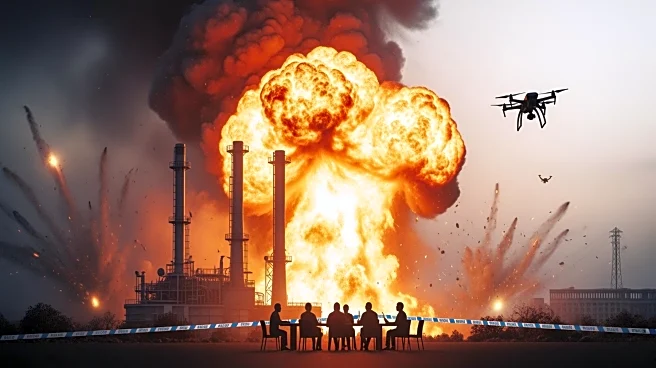What's Happening?
Ukraine has launched a series of drone strikes targeting key Russian infrastructure, including a Lukoil oil refinery in Nizhny Novgorod Oblast and a petrochemical plant in Bashkortostan. According to Ukraine's
military intelligence, over 50 Ukrainian-made drones were deployed in the operation, which involved the Armed Forces and Special Operations Forces. The Lukoil refinery, a major supplier of fuel to the Moscow region, was hit while undergoing repairs, causing significant damage. Additionally, explosions at the petrochemical plant in Sterlitamak led to the collapse of part of the water purification facility, although no injuries were reported. Russia's Defense Ministry claimed to have downed 85 drones across various regions, but the attacks have caused disruptions, including power outages in Kursk region.
Why It's Important?
These strikes represent a significant escalation in Ukraine's military tactics, targeting Russia's economic infrastructure that supports its war efforts. By hitting oil refineries and petrochemical plants, Ukraine aims to disrupt the supply chain and economic resources that fund Russia's military operations. This could lead to increased pressure on Russia's domestic energy supply and economic stability, potentially affecting fuel prices and availability. The strikes also demonstrate Ukraine's capability to conduct operations deep within Russian territory, challenging Russia's defense systems and potentially altering the strategic landscape of the conflict.
What's Next?
The ongoing conflict between Ukraine and Russia is likely to see further military engagements, with Ukraine continuing to target strategic infrastructure. Russia may respond by bolstering its air defense systems and increasing security around key facilities. International reactions could vary, with potential diplomatic discussions or sanctions aimed at de-escalating the situation. The impact on global energy markets may also be monitored closely, as disruptions in Russian oil production could influence international fuel prices.
Beyond the Headlines
The ethical implications of targeting civilian infrastructure in warfare are complex, raising questions about the balance between military objectives and humanitarian concerns. The long-term effects on the environment and local communities in affected regions could be significant, with potential pollution and economic hardship. Additionally, the conflict may influence global geopolitical dynamics, as countries reassess their alliances and strategies in response to the evolving situation.











